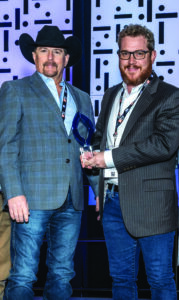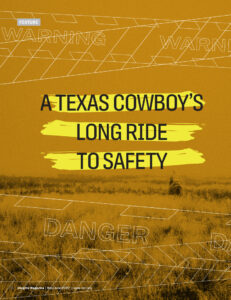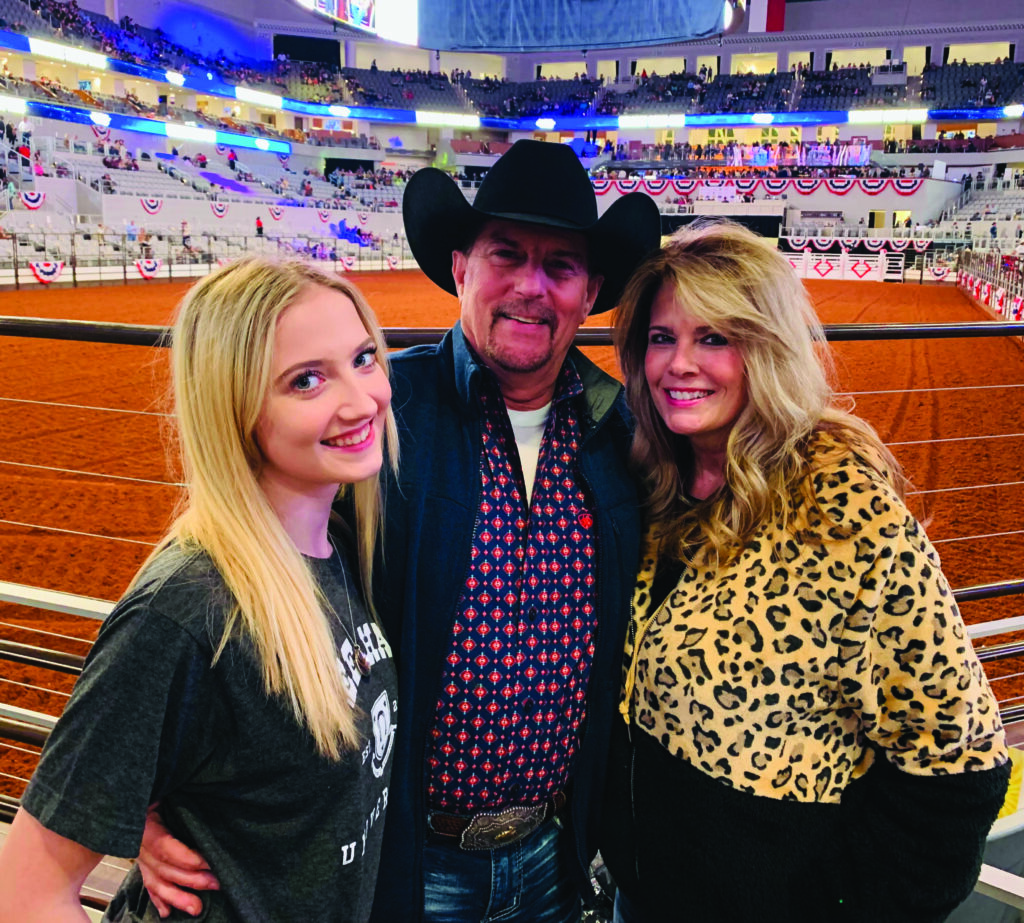In the early 1980s—after playing around in the rodeo arena—Mark Piland did what all his friends were doing and joined the fire department. Along with standard fire safety training, he was trained as an EMT and later a paramedic. After numerous unsafe calls, Mark started questioning his place at the fire department.
“I was accident prone,” he explained. Mark began thinking about a different career path. He pondered his acquired skills to date. Riding horses and calf-roping weren’t any safer than firefighting. Emergency healthcare often brought him into dangerous situations. What could he do with a fearlessness for high places? Then a lightbulb went off. More accurately, a bunch of lightbulbs.
The City of Fort Worth has over 60,000 street and 923 traffic lights. Changing those lightbulbs and installing new street lights was a full time job for someone not afraid of heights. So Mark went from the fire station to the Department of Transportation and Public Works to help maintain this important aspect of the city’s infrastructure. He spent more than a decade repairing and modernizing Fort Worth’s roadway lighting systems and utility lines. It was late in 2005, working high above the ground, that he determined it was time to get off the poles and start using his head. With his acquired knowledge of electrical work and understanding of how the city operated, he quickly found work with Hunt Construction Group—a national general contracting firm.
Hunt provided Mark with his first view of the private sector and a new sense of pride in his work. “Utility work is steady, but hard to explain to  your friends and family.” Mark was now working on large projects he could drive past and feel a sense of accomplishment. He was a construction superintendent for Hunt, overseeing all the tradespeople on a project. He learned to read blueprints and understand the cadence required to complete projects on time and on budget. Mark’s future seemed limitless, right until the 2008 recession struck. Hunt found itself with too many employees and too few projects in the pipeline. Mark began to worry about his job.
your friends and family.” Mark was now working on large projects he could drive past and feel a sense of accomplishment. He was a construction superintendent for Hunt, overseeing all the tradespeople on a project. He learned to read blueprints and understand the cadence required to complete projects on time and on budget. Mark’s future seemed limitless, right until the 2008 recession struck. Hunt found itself with too many employees and too few projects in the pipeline. Mark began to worry about his job.
Mark learned from his VP of operations that he was being transferred to Hunt’s Safety Department. This was Hunt’s way of keeping Mark employed during the recession, but Mark was initially discouraged by the change. He enjoyed the tangible nature of his construction supervisor role. “How do you get excited about safety,” he wondered. But as it turned out, safety was the role he had been training for his entire career.
If Mark learned one thing through his passion of rodeoing, it was the speed at which things went from bad to worse. His firefighting career provided insight on the consequences of unsafe behavior. His new role was about seeing nothing—completing construction projects without injury or accident. “I’m now measured by the number of reportables on a project. The goal is zero.” It was a new mindset for Mark, diligently focusing on the health and welfare of his coworkers over budgets and schedules.
Mark jumped into his new role with both feet, managing the safety and reporting process for all the trades on a project. It was a “pressure cooker,” requiring Mark’s attention seven days a week. The new job was hard on his family. He learned how to create a safe workspace, but the job was taking a toll on him. In 2013 he began looking for something different, and that’s when he found JMEG.
“JMEG cares about its people and is committed to safety. It’s a cultural commitment.” Mark recognized this from his first meeting with Bill Mitchell, VP and owner, and the rest of management. “Safety requires top down leadership. At JMEG, the job was less of a statistics game and more about the people.” It was also more focused, as the business is solely electrical contracting. Mark loved the clarity and camaraderie of his new role—JMEG’s corporate safety director.
Many contractors see safety as a requirement, and thus the safety programs and procedures seem tedious and counter to the business culture. In these businesses, safety is a cost—something that slows the project down and creates a bunch of rules requiring enforcement. Mark takes a different approach. With the help of top management, he’s made safety a central tenet of JMEG’s culture.
“My job is to get all our employees home safely to their families each day.” This is Mark’s why, and it helps him develop a bond with JMEG’s electricians. His training sessions and rules are understood as a benefit instead of a hindrance. When he visits JMEG construction sites and meets employees, “They all know my name and that I’m here to help them.” His job is to report on all the safety violations and areas for improvement to the general contractor— even those of other subs.
Beyond getting his employees home to the dinner table each night, Mark’s work also has helped grow JMEG’s business. Safety is visible statistically in what doesn’t happen—reportables to be specific. Many new contracts are offered to businesses based on total cost, and one of those line items is insurance claims. JMEG’s programs have reduced EMR (emergency medical recordables) and thus make their bids more attractive. Contractors utilizing OCIP (owner controlled insurance programs) are more likely to award contracts to businesses that have proven safety records. Safety is good for business.
Mark has a partner at JMEG—Risk Manager Drew Naizer. “We’re like Batman and Robin.” Mark identifies as Batman of course. Together, they collaborate on understanding the risks and the liabilities on proposed work. “When you have risk and safety working together, you know you’ve won.” Again, Mark credits JMEG’s top management with building this culture of safety.
JMEG has won the IEC Safety Award for four consecutive years. According to their website, the IEC Safety Award “recognizes electrical contracting companies that excel in establishing and maintaining safety programs that result in incident rates that are significantly below the average OSHA recordable incident rate. The judges look for commitment to safety from management, employee involvement, active participation, and controls over major exposure to loss. Only two finalists are selected from each of the five categories based on company size.”
But Mark still thinks JMEG can do better. “I can teach them everything they should do, but at the end of the day, personal choice is important.” Even the best trained employees can make bad decisions. Mark’s next endeavor involves behavioral based safety training, with a focus on making good behaviors into encoded mental habits.
As a Fort Worth native, Mark’s pride in the impact he’s made on the community is undeniable (and well deserved). Driving around town, his 19 years of utility work for the city are seen at any traffic light, his early construction work with the Hunt construction team stands physically at Bailey Boswell and Saginaw High Schools, and perhaps his most rewarding yet least visible work shows at family dinner tables in homes all over town where employees come home safely from work every night.
JMEG delivers electrical construction and facility services throughout the state of Texas. Offices are located in Austin, Dallas, Fort Worth, and San Antonio. Mark works out of the Dallas office and currently serves on IEC Fort Worth/Tarrant County Chapter’s safety committee. JMEG, LLC is the proud winner of the IEC Safety Award for the years of 2015/2016, 2016/2017, 2017/2018, and 2020/2021.


